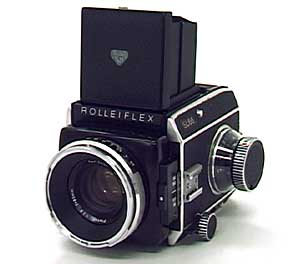
I have stuff. I've used eBay to sell some. In the past I would put a camera up for auction and it would sell at a profit, like a hot stock. But more recently, I put up my entire Rollei camera outfit. It was a classic kit and went for half what I paid for it. And the other day, the guts of my outmoded multi-thousand-dollar edit system went for $80. Markets can provide an experience not unlike the amusement park ride that makes you throw up. Walter Kirn put it like this recently in the New York Times Magazine:
"According to the worldly theologians of finance and commerce, a force known as "the business cycle" that governs the rise and fall of markets was supposed to have taken us higher by now, replenishing depleted bank accounts, restoring a sheen of functionality to corroded Rust Belt cities and permitting again the buying and selling of homes. The rock in front of this tomb remains in place, though, and the day of rejoicing still appears far off."
If you look at the value of things in terms of numbers, well, it can get you nuts. Since going nuts is expensive, I'm trying to think of markets differently. Like my 1960s era Rollei SL66 camera. It included a type of Zeiss lens that many believe was among the finest ever made. It was a sad day when I eBay'd it. But the man who came to pick it up turned that around.
He was Japanese, a pocket-protector type engineer who was passing through California on his way back home. He explained that in Japan there's a tradition of asking retired engineers to work on projects -- a way of using, and respecting, their wisdom. The guy who came to get my camera was on a mission. He was going around the States buying great lenses to give to a retired engineer in Japan. The old guy was going to study them so he could make better lenses for the digital age. Suddenly my heirloom Rollei was pointing the way to the future. Some old guy whose skills may have been ignored over here was leading the charge in Japan. I liked the sound of that, so I gave the engineer a light meter and a couple of filters to go with the Rollei. The transaction transformed the value of my camera -- raising it.
Max Strom, a yoga teacher, has seen the value of yoga increase among people who drive $85,000 cars. These folks arrive at his classes, turn off their cell phones and spend $20 to look inside themselves and see what they might find. As Max wrote, the experience often "triggers the profound realization that a 90 minute, $20 yoga class fulfills many of their essential needs, more than any of their other possessions they have worked like dogs to obtain." The value of that $20? Pretty huge. Even more when you consider, as Max argues, that "Yoga is being embraced primarily by college-educated, upper-middle-class thinkers and businesspeople in positions of power -- the very strata of society that has the power to make the changes this world so desperately needs."
I believe in money, because I use it to pay my mortgage. But when the true value of a yoga class or an old camera floats way above its money value, suddenly you're playing the spiritual stock market -- and that's always a good bet.